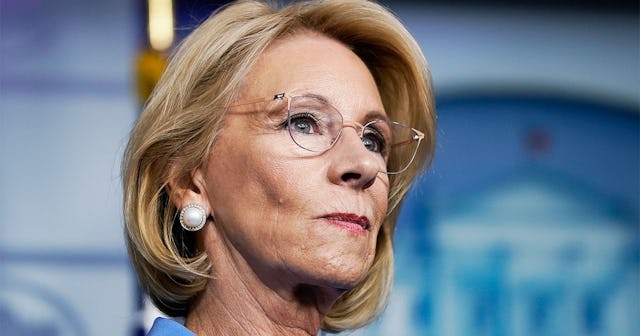Betsy DeVos Demands That Public Schools Share Pandemic Aid With Private Schools

In a controversial move, Education Secretary Betsy DeVos is demanding that public school districts share their COVID-19 rescue funds with private school students — regardless of income
Education Secretary Betsy DeVos has announced she’s going ahead with a policy that will take millions of dollars in federal coronavirus relief funds issued to public schools, and hand them over to private primary schools and secondary schools across the nation. In a letter to the Council of Chief State School Officers, the republican official announced the controversial move, defending why she believes education funding from the Coronavirus Aid, Relief and Economic Security Act, or CARES Act, should be spent on the private sector.
“The CARES Act is a special, pandemic-related appropriation to benefit all American students, teachers and families,” she wrote. “There is nothing in the act suggesting Congress intended to discriminate between children based on public or nonpublic school attendance, as you seem to do. The virus affects everyone.”
The New York Times points out that, according to many education officials, the move would take “millions of dollars from disadvantaged students and force districts starved of tax revenues during an economic crisis to support even the wealthiest private schools,” — in essence taking from the poor and giving to the rich.
The association representing the nation’s schools superintendents, the Council of Chief State School Officers, also say that it could “significantly harm the vulnerable students who were intended to benefit the most,” per the AP. It also told districts to ignore the guidance, and at least two states — Indiana and Maine — said they would.
Jennifer McCormick, Indiana’s superintendent of public instruction, explained they are rejecting DeVos’ guidance, on the grounds that, legally, it amounts to no more than a recommendation. On Twitter she revealed that she plans to distribute the virus funding “according to Congressional intent and a plain reading of the law.”
“I will not play political agenda games with COVID relief funds. Our most at-risk students depend on this commitment,” she tweeted.
While private schools, responsible for educating around 5.7 million of the nation’s children, are thought to be brimming with finances, they claim that the pandemic has left them in crisis due to a decrease in enrollment and tuition revenues. According to DeVos’ letter, “a growing list of nonpublic schools have announced they will not be able to reopen, and these school closures are concentrated in low-income and middle-class communities.” The NYT also points out that some private schools serve low-income students, many that live in districts with failing public school systems.
“I don’t understand why we have to pick winners and losers when everything we’re asking for is targeted at helping children and families,” Jennifer Daniels, the associate director for public policy for the United States Conference of Catholic Bishops, in support of DeVos.
Federal education law already requires school districts to use funding intended for their poorest students to provide “equitable services,” such as tutoring and transportation — not only for low-income public students, but private school students within their districts as well. However, with DeVos’ guidance, she would give private schools even more of a financial boost.
For decades DeVos has been an advocate of funneling public dollars into the private school sector, and admitted during a radio interview last week, reported by Chalkbeat, that she was using the current health pandemic to do so. During the interview DeVos was asked by Roman Catholic archbishop of New York, Cardinal Timothy M. Dolan, if she was using “this particular crisis to ensure that justice is finally done to our kids and the parents who choose to send them to faith-based schools.” Her response? “Absolutely.”